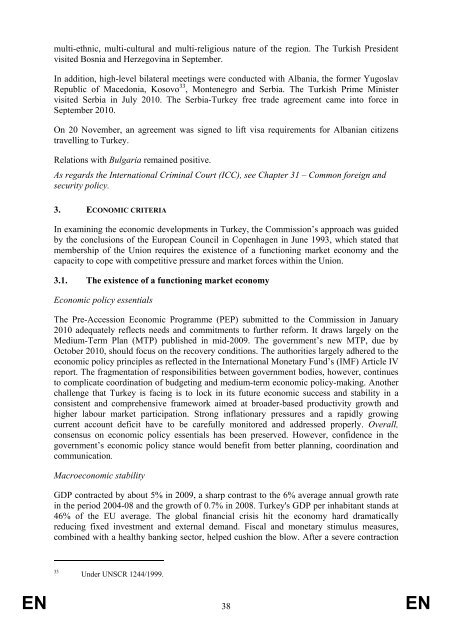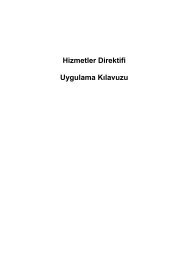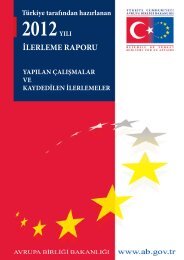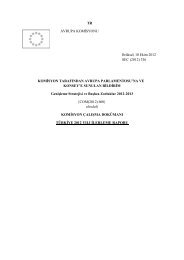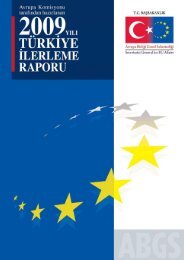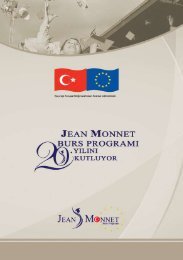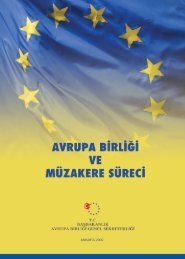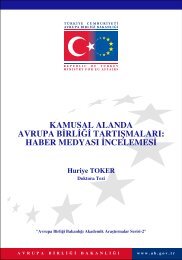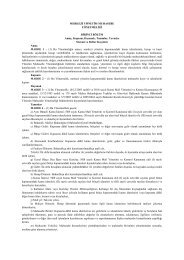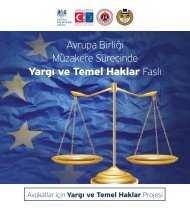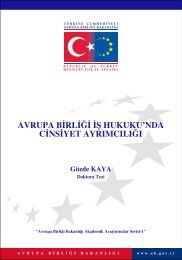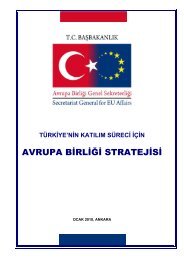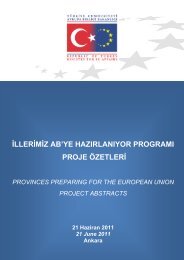2010 ilerleme raporu - Avrupa Birliği Bakanlığı
2010 ilerleme raporu - Avrupa Birliği Bakanlığı
2010 ilerleme raporu - Avrupa Birliği Bakanlığı
Create successful ePaper yourself
Turn your PDF publications into a flip-book with our unique Google optimized e-Paper software.
multi-ethnic, multi-cultural and multi-religious nature of the region. The Turkish Presidentvisited Bosnia and Herzegovina in September.In addition, high-level bilateral meetings were conducted with Albania, the former YugoslavRepublic of Macedonia, Kosovo 33 , Montenegro and Serbia. The Turkish Prime Ministervisited Serbia in July <strong>2010</strong>. The Serbia-Turkey free trade agreement came into force inSeptember <strong>2010</strong>.On 20 November, an agreement was signed to lift visa requirements for Albanian citizenstravelling to Turkey.Relations with Bulgaria remained positive.As regards the International Criminal Court (ICC), see Chapter 31 – Common foreign andsecurity policy.3. ECONOMIC CRITERIAIn examining the economic developments in Turkey, the Commission’s approach was guidedby the conclusions of the European Council in Copenhagen in June 1993, which stated thatmembership of the Union requires the existence of a functioning market economy and thecapacity to cope with competitive pressure and market forces within the Union.3.1. The existence of a functioning market economyEconomic policy essentialsThe Pre-Accession Economic Programme (PEP) submitted to the Commission in January<strong>2010</strong> adequately reflects needs and commitments to further reform. It draws largely on theMedium-Term Plan (MTP) published in mid-2009. The government’s new MTP, due byOctober <strong>2010</strong>, should focus on the recovery conditions. The authorities largely adhered to theeconomic policy principles as reflected in the International Monetary Fund’s (IMF) Article IVreport. The fragmentation of responsibilities between government bodies, however, continuesto complicate coordination of budgeting and medium-term economic policy-making. Anotherchallenge that Turkey is facing is to lock in its future economic success and stability in aconsistent and comprehensive framework aimed at broader-based productivity growth andhigher labour market participation. Strong inflationary pressures and a rapidly growingcurrent account deficit have to be carefully monitored and addressed properly. Overall,consensus on economic policy essentials has been preserved. However, confidence in thegovernment’s economic policy stance would benefit from better planning, coordination andcommunication.Macroeconomic stabilityGDP contracted by about 5% in 2009, a sharp contrast to the 6% average annual growth ratein the period 2004-08 and the growth of 0.7% in 2008. Turkey's GDP per inhabitant stands at46% of the EU average. The global financial crisis hit the economy hard dramaticallyreducing fixed investment and external demand. Fiscal and monetary stimulus measures,combined with a healthy banking sector, helped cushion the blow. After a severe contraction33Under UNSCR 1244/1999.EN 38 EN


